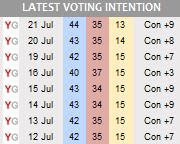Not much attention has been given to this proposal among the fuss about voting systems and the number of MPs. But members of the public having the right to comment directly on legislation as it is going through the Houses of Parliament is incredibly radical. It is an attempt to bring direct democracy to the UK - and I am entirely against it.
Give the right to random individuals to amend laws governing us all and you invite the crazed ('passionate') about single issues to rule over the moderate, and silent, majority. That is what representative democracy is there to avoid. I elect my MP to debate and amend legislation and given that they are a member of a political party that is made up of a broad coalition of interests in the country, they will tend to represent a broad section of the electorate quite successfully. Who does my neighbour represent but him or herself?

More importantly, who do the RSPCA represent? Greenpeace? These kinds of interest groups have a very strong tendency to authoritarianism - if individuals don't behave the way they want them to, they reach for the tools of the state (legislation and taxes) to force them to do so. I shudder at the thought of giving them power over legislation.
I can't really see what safeguards could be built in to avoid such undue influence by interest groups though. One could perhaps filter out the sort of copy-and-paste 'grassroots' campaigns that so burden MPs' secretaries now. But more importantly how can one ensure that the much larger number of people that are impacted by legislation but not passionate about the issue at stake have their voice to counteract such lobbying efforts?
Or will MPs simply overrule the public amendments? In which case how will the public react? What is the point of allowing the public to have an input and then ignoring it? That will fuel yet more cynicism about politics.
On all counts, this proposal fails. It will not yield better legislation or better democracy.
Fortunately, this reform will be of the slower kind and will afford the opportunity to learn from mistakes - there will be 'pilots' only in November 2011.
*image found on
Nuclear Power Gallery






